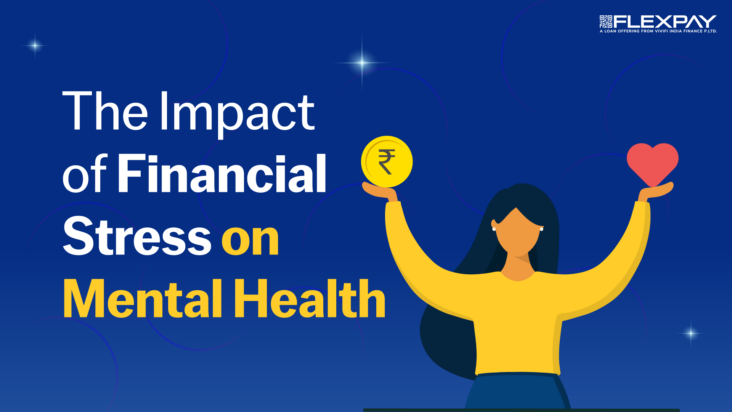The Impact of Financial Stress on Mental Health

Have you ever felt stressed about money? If yes, you’re not alone. Many people go through tough times financially, whether it’s because of debts, unexpected bills, or losing a job. This kind of stress can affect how we feel mentally. Let’s talk about it. In India, a study found that almost 60% of people felt quite stressed about money. Also, about 44% said they were having a hard time financially, which is more than the global average. In India, 36% felt their mental health was getting worse (compared to 28% globally), 32% lost motivation for work (25% globally), and 31% felt disconnected from their lives (23% globally). These numbers show that financial stress can affect how we feel. Let’s explore this further and see what we can do about it.
Understanding Financial Stress
Financial stress occurs when an individual feels overwhelmed by their financial situation. It can manifest in various ways:
- Anxiety and Worry: Constantly thinking about bills, debts, and financial obligations can lead to persistent anxiety. The fear of not being able to meet financial responsibilities can be mentally exhausting.
- Depression: Financial stress often contributes to feelings of sadness, hopelessness, and despair. The weight of financial burdens can lead to a sense of helplessness and affect overall mood.
- Physical Health Issues: Chronic stress can have physical consequences, including headaches, muscle tension, and sleep disturbances. Financial stress may worsen existing health conditions or lead to new ones.
- Relationship Strain: Money-related disagreements are a common cause of relationship conflicts. Couples may argue about spending habits, saving goals, and financial priorities.
The Vicious Cycle
Financial stress and mental health are interconnected in a vicious cycle.
- Stress Triggers Mental Health Issues: When faced with financial difficulties, individuals experience stress. This stress activates the body’s fight-or-flight response, leading to increased cortisol levels and impacting mental well-being.
- Mental Health Challenges Affect Financial Decision-Making: Depression, anxiety, and other mental health issues can impair decision-making abilities. Individuals may make impulsive choices, avoid financial planning, or neglect important tasks.
- Reduced Productivity and Focus: Financial stress can distract individuals from work or other responsibilities. Reduced productivity may lead to job instability, further exacerbating financial strain.
Coping Strategies
While financial stress is inevitable at times, there are strategies to manage its impact:
- Create a Budget: Develop a realistic budget that outlines income, expenses, and savings goals. Knowing where your money goes can reduce anxiety.
- Emergency Fund: Establish an emergency fund to cover unexpected expenses. Having a financial safety net provides peace of mind.
- Seek Professional Help: Consult a financial advisor or counselor. They can offer personalized advice and help you create a plan to tackle debt or improve financial habits.
- Self-Care: Prioritize self-care to manage stress. Exercise, meditation, and spending time with loved ones can improve mental well-being.
- Avoid Comparisons: Social media and societal pressure can make financial stress worse. Remember that everyone’s situation is unique, and comparing yourself to others isn’t productive.
- Consider Alternatives: Instead of solely relying on Instant online loans, explore options like FlexPay. With flexible repayment options and a straightforward process, it offers a viable solution for addressing debt or managing expenses. Diversifying your approach and considering alternatives to traditional loans can help mitigate financial stress and pave the way for a more stable financial future.
Remember, reducing financial stress is an ongoing process that requires discipline, patience, and a willingness to make changes to your spending and saving habits.
Conclusion
Financial stress affects mental health, but proactive steps can mitigate its impact. By understanding the connection between the two and implementing coping strategies, individuals can navigate financial challenges while safeguarding their well-being. Remember that seeking professional help is a sign of strength, not weakness. You’re not alone, and there are resources available to support you on your financial and mental health journey.
To beat financial challenges and save you from financial stress, you can use alternative measures. Using a line of credit can work as a permanent credit backup for you. In a credit line, you pay the interest only when you spend the money. When you are not using it, you are liable for no interest, unlike traditional personal loans. This feature makes it a perfect solution for all your financial needs that you can use and pay back at your convenience. You can rely on the FlexPay line of credit for your line of credit. It offers you a flexible payback option and relaxed eligibility criteria.
Disclaimer: The information provided in this blog post is for educational purposes only and should not replace professional advice. If you’re experiencing severe financial stress or mental health issues, please seek help from a qualified professional.
